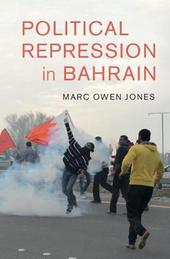
|
Political Repression in Bahrain
Hardback
Main Details
| Title |
Political Repression in Bahrain
|
| Authors and Contributors |
By (author) Marc Owen Jones
|
| Series | Cambridge Middle East Studies |
|---|
| Physical Properties |
| Format:Hardback | | Pages:400 | | Dimensions(mm): Height 234,Width 158 |
|
| ISBN/Barcode |
9781108471435
|
| Classifications | Dewey:323.044095365 |
|---|
| Audience | | Tertiary Education (US: College) | | Professional & Vocational | |
|---|
| Illustrations |
Worked examples or Exercises
|
|
Publishing Details |
| Publisher |
Cambridge University Press
|
| Imprint |
Cambridge University Press
|
| Publication Date |
16 July 2020 |
| Publication Country |
United Kingdom
|
Description
Exploring Bahrain's modern history through the lens of repression, this concise and accessible account work spans the twentieth and twenty-first centuries, looking at all forms of political repression from legal, statecraft, police brutality and informational controls. Considering several episodes of contention in Bahrain, from tribal resistance to the British reforms of the 1920s, the rise of the Higher Executive Committee in the 1950s, the leftist agitation of the 1970s, the 1990s Intifada and the 2011 Uprising, Marc Owen Jones offers never before seen insights into the British role in Bahrain, as well as the activities of the Al Khalifa Ruling Family. From the plundering of Bahrain's resources, to new information about the torture and murder of Bahrain civilians, this study reveals new facts about Bahrain's troubled political history. Using freedom of information requests, historical documents, interviews, and data from social media, this is a rich and original interdisciplinary history of Bahrain over one hundred years.
Author Biography
Marc Owen Jones is Assistant Professor in Middle East Studies and Digital Humanities at Hamid bin Khalifa University where his research focuses on issues of social justice and the Gulf. He is the co-editor of Gulfization of the Arab World (2018) and Bahrain's Uprising: Resistance and Repression in the Gulf (2015). In addition to his academic work, he contributes to the Washington Post, New Statesman, CNN, the Independent, PEN International, and appears frequently on the BBC, Channel 4 News, and Al Jazeera.
Reviews'A meticulously researched and troubling historical account of political violence in the small island of Bahrain. Jones captures the many dark sides of state repression, inflicted on individuals, activists and communities. A rich study of how policing citizens, spreading fear, and extracting consent operate in a context where there is no accountability and justice. A must-read.' Madawi Al-Rasheed, London School of Economics 'Little understood, often ignored, and with unwavering support from Western powers, Bahrain is home to one of the most oppressive regimes in the world. Jones' fascinating and troubling study is a must-read for those concerned about violence, human rights, and the obstacles to justice in the oil-rich Persian Gulf.' Toby C. Jones, Rutgers University 'A must-read for those interested in understanding the resilience of colonial legacies in the Arabian Gulf. This is a well-documented analysis of dynamic relationship between various forms of repression and resistance. Jones skillfully positions his narrative of Bahrain's modern history within academic accounts of subordination and domination.' Abdulhadi Khalaf, Lund University 'Original, thoroughly researched, theoretically framed and utterly compelling, this is the only systematic scholarly examination of the nature, tools and uses of repression as a key feature of Bahrain's politics over the past century. A key point of reference for further work on Bahrain, on the politics of the Gulf states more generally, and for the comparative study of repression and autocratic rule.' Gerd Nonneman, Georgetown University 'Marc Owen Jones breaks new ground in this fascinating study of how the nature and pattern of political repression in Bahrain has evolved over time and in response to changes in circumstance. The result is a book that adds greatly to our understanding of the survival strategies of authoritarian regimes.' Kristian Ulrichsen, Rice University
|